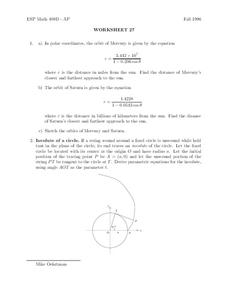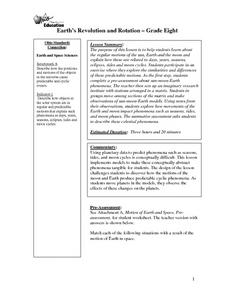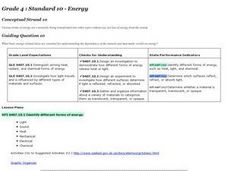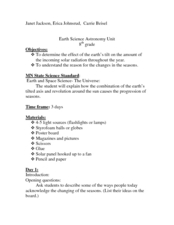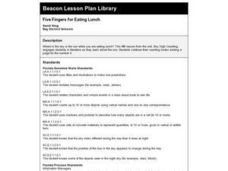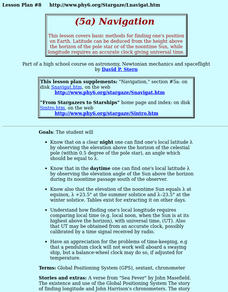Curated OER
Phases of the Moon
Students use a simple physical model of the Earth, sun, and moon to understand why the moon changes phases from the perspective of Earthly observers. They hold up balls representing the moon in a room with a single light source to see...
Curated OER
Hopping Across the Solar System
Students role-play and communicate that objects in space have describable properties, locations, and movements. Students identify and communicate effectively that Earth is the third planet from the Sun in the solar system, eight other...
Curated OER
Worksheet 27
In this math worksheet, students examine the equations for the planets of Mercury and Saturn. Then they find the distance of Saturn’s closest and farthest approach to the sun.
Curated OER
Earth's Revolution and Rotation
Eighth graders investigate the regular motions of the sun, Earth and the moon and explain how these are related to days, years, seasons, eclipses, tides and moon cycles. They participate in an exercise where they explore the...
Curated OER
The Phases of the Moon
Pupils sketch the different phases of the moon after exploring them on an internet program. In this moon phases lesson plan, students discuss how the Sun, Earth, and Moon are related.
Curated OER
Independent Practice 2: Ordinal Numbers
In this ordinal numbers learning exercise, students read and follow instructions containing ordinal numbers. They draw specified items on a grid, placing them in a described column and row. Afterward, students recognize the months of the...
Curated OER
Be A Planet
Students identify the name, order and attributes of the planets. They role play the position of planets, and draw pictures of the planets as well.
Curated OER
Energy
Students see that energy is everywhere in nature - in the light of the sun, in wind, in falling water and erupting volcanoes. Without energy, there is no life. This lesson plan provides many good ideas across the curriculum to study energy.
Curated OER
Light and Shadows
Students observe and record the apperacne of shadows and how their position and shpae changes during the course of the day. Students measure and record the length oof a partner's shadow at different intervals during the day. In pairs,...
Curated OER
Scientific Notation
For this algebra worksheet, students identify the correct method to write positive and negative exponents. They solve word problems and write in scientific notation. There are 21 questions with an answer key.
Curated OER
Earth Science Astronomy Unit: Seasons on Earth
Eighth graders describe how the Earth's position causes seasonal changes. In this astronomy lesson, 8th graders explain how solar radiation varies depending on the season. They create a collage or poster on each of the Earth's four seasons.
Curated OER
Exploring Earth Through Maps and Technology
In this maps worksheet, students read 3 pages of detailed information about maps, latitude, longitude, topography, satellites and global positioning. Students then answer 10 questions. There is also a research project assignment available.
Curated OER
Time
Students make a sundial. In this time lesson, students determine the time of the day by creating a sundial. They check the time on the sundial, hourly, for one week. Afterward, they explore what happened to the shadows in reference to...
Curated OER
Building a Class Government Through Elections
Students participate in their own classroom election to fill multiple positions. Individually, they examine campaign speeches and write their own. Once the election occurs, they must fulfill their duties as outlined in their campaign.
Curated OER
Sundials: Observing and Using Shadows
Young scholars build sundials and observe changes in shadows over the course of one or more days. They identify patterns in the shadows and discuss how shadows may be used to tell time.
Curated OER
Solar Box Cooker
Students explore solar power. In this solar power instructional activity, students build simple solar cookers after they study convection, conduction, and radiation. Students transfer their knowledge of how the solar cooker works to...
Curated OER
Five Fingers for Eating Lunch
First graders listen to the book, The M&M's Brand Counting Book, discuss the one-to-one correspondence and count the candies in the story. They focus on the number five, and listen to the story Sun Up, Sun Down, discussing the...
Curated OER
Make a Shadow Clock
Students make shadow clocks. In this earth science lesson, students follow the provided steps to make shadow clocks out of the provided pattern and tagboard. A game, a song, a craft, and a recipe are all included with the lesson.
Curated OER
Make a Shadow Clock
Learners create a shadow clock. In this time instructional activity, students make their own shadow clock or sundial from tag board. They place it on the ground and check it every hour to mark where the shadow lies.
Curated OER
Transpiration
Students interactively explore the term transpiration. In this science/ecology lesson plan, students discuss what they would do if they were thirsty while conducting research in Brazil. Additionally, students write descriptive words to...
Curated OER
The Analemma
Students describe the relationship between the tilt of Earth's axis and its yearly orbit around the sun, by learning about analemmas. They determine what they can do to show that the sun's position doesn't change, and they find ways to...
Curated OER
Naval Warfare in the American Revolution
Students determine speed and bearing, calculate a position by dead reckoning, and modify this position using vectors for wind and current drift.
Curated OER
Navigation
Students study the basic methods for finding one's position on Earth. Latitude can be deduced from the height above the horizon of the pole star or of the noontime Sun, while longitude requires an accurate clock giving universal time.


